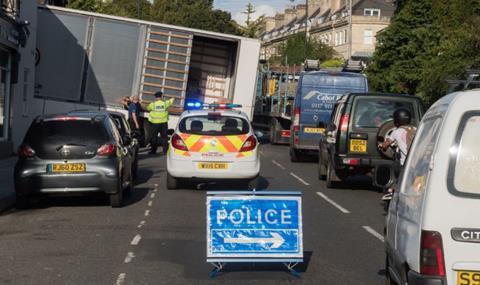
Councils are urging the government to change the law and force all HGV drivers to use specialist satnavs and prevent “major disruption” to local communities.
The Local Government Association (LGA), which represents councils in England and Wales, said villages were being blighted by incidents where lorries have blocked streets and crashed into bridges as a result of driving down routes not suitable for their size or weight.
It cited incidents that have occurred this year, including a Tesco truck blocking a street in Bristol for 15 hours, with the vehicle so badly wedged it required a crane to dislodge it; an HGV carrying paint that collided with a bridge in Leicestershire, spilling substantial amounts of paint over the road and blocking it for 12 hours and a car transporter that became trapped on a country road in Somerset and blocking access to homes in the area.
The LGA wants the government to use the forthcoming Transport Bill to require HGV drivers by law to use lorry-specific satnav devices, rather than currently only advising.
These devices include bridge heights, narrow roads and routes unsuitable for trucks, as well as requiring the driver to input their vehicle’s dimensions, so that they are only guided along appropriate roads.
The LGA said HGV mileage has grown by nearly 9% in the last year and is back to pre-pandemic levels.
Councillor David Renard, LGA transport spokesman, said: “The spate of accidents we continue to see involving lorries blocking streets, damaging local areas and crashing into bridges on an all too regular basis are causing major disruption to local communities.
“Councils already work with freight and haulage companies to ensure that lorries use the most suitable routes and roads.
“However, there are a minority of drivers who continue to follow satnav systems that take them down routes that are totally inappropriate for the weight and height of their vehicle.”
Renard added: “By making it mandatory for anyone operating an HGV to use a specialist satnav device, the government can help to reduce the risk of accidents and keep our roads moving.”
Transport lawyers Weightmans recently urged logistics firms to ensure their satnav systems were fit for purpose after representing hauliers called to public inquiries following bridge strikes.
Charlotte Hunt, transport regulatory solicitor at Weightmans, said: “Within the industry, there can be overreliance on navigation systems that don’t meet minimum required safety standards, and that do not have the ability to warn drivers of potential hazards along the way.
“Equally, operators must have guidelines in place that mandate regular system updates to ensure satnavs are equipped with the latest road network information and height restrictions in order to maintain compliance.”











